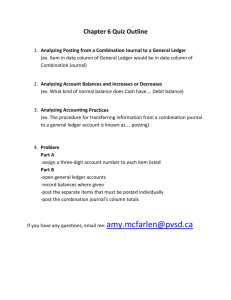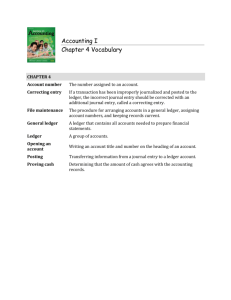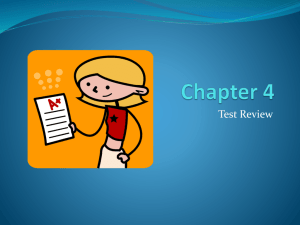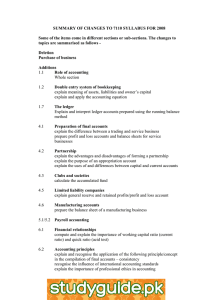Item 3_Mapping Data exctraction and short codes - 22 June 2015 - ICF
advertisement
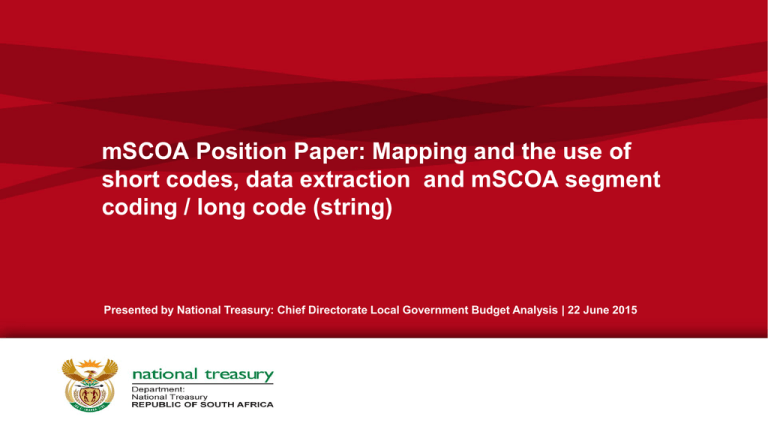
mSCOA Position Paper: Mapping and the use of short codes, data extraction and mSCOA segment coding / long code (string) Presented by National Treasury: Chief Directorate Local Government Budget Analysis | 22 June 2015 Mapping The Mayor is invited to attend a SALGA workshop and books an airplane ticket. This was not budgeted for specifically but he has an vote under Council and General for S&T. (This is the legacy vote number.) At month end this transaction is put through a program to allocate / MAPPING … extrapolate the transaction to the mSCOA segments. Based on the description and certain pre configured defaults. Also manual corrections is done and virement to align the budget is required “Mapping of the mSCOA classification framework to the current general ledger as informed by the master data table of a financial application does not fulfil the requirements of the mSCOA Regulation. Municipalities that adopt this approach in implementing the mSCOA Regulation will be deemed to be non-compliant to the Regulation” Item Expenditure: Operational Cost: Travel and subsistence: Domestic: Travel with operator: Air Transport Function: Executive and Council: Core function: Mayor and Council Funded: Revenue: Taxes: Property Rates Project : Default Region: Whole of Municipality Translation table – Short Codes The Mayor is invited to attend a SALGA workshop and books an airplane ticket. This was budgeted for specifically and has an vote under Council and General for S&T / Air travel. (This is one of thousands of new vote numbers.) At reporting time the other segments get written into the Business intelligence database This is a short code and has a one on one relationship or lookup table to the mSCOA segments. Item Expenditure: Operational Cost: Travel and subsistence: Domestic: Travel with operator: Air Transport Short code Translation … “A short code is not considered to be a mapping exercise. Short code keys relate to the specific system setup and consist of “two sets” pointing to each other. Importantly, a short code key does not function independent of the overall classification framework and has no value if separated and there must exist a direct relationship to the long code.” Function: Executive and Council: Core function: Mayor and Council Funded: Revenue: Taxes: Property Rates Project : Default Region: Whole of Municipality Project driven tree structure The Mayor is invited to attend a SALGA workshop and books an airplane ticket. This was budgeted for specifically and is assigned to a Project. The item inside the project is configured with all the segments and transaction is carrying all the segment detail. Importantly the project choice in not default as it Vehicle Municipal Running Cost: Mayor Office Rental Infrastructure Admin costs Projects: Non Infrastructure: Operating Costs: Transfers Mayoral Campaigns Typical Work stream Functions and events Strategic Planning: Workshops and events Investment Properties Project tree – Long Code or Guid The Mayor is invited to attend a SALGA workshop and books an airplane ticket. This was budgeted for specifically using the decision tree to arrive at all segments and has a Project. At transaction time the other segments get written into the database based on the configured project. Subsequently data and reporting is effectively directly accessible. Item Expenditure: Operational Cost: Travel and subsistence: Domestic: Travel with operator: Air Transport mSCOA segments … “Compliance to the mSCOA classification framework therefore requires that the master data tables of all financial systems (applications) be informed by the detail transactional classification as prescribed by the segments of the mSCOA Regulation which in turn posts to the general ledger.” Function: Executive and Council: Core function: Mayor and Council Funded: Revenue: Taxes: Property Rates Project : Strategic Planning: Workshops and events Region: Whole of Municipality Other Considerations • National Treasury, supported by the mSCOA Regulation requires that transactional detail be recorded by selecting a classification from each of the seven (six if municipal standard classification is not used) regulated segments of the mSCOA classification structure. The system may have functionality that drives the subsequent selections based on parameters or attributes. This selection must inform the posting level within the traditional general ledger. • Compliance to the mSCOA classification framework therefore requires that the master data tables of all financial systems (applications) be informed by the detail transactional classification as prescribed by the segments of the mSCOA Regulation which in turn posts to the general ledger. • It is the preference of National Treasury that the fixed account coding structure (long code) be applied throughout all municipalities and municipal entities in ensuring consistency should the system application be able to accommodate the account coding. • The code structure has been developed to provide for sufficient fields and digits for future expansion of the account codes. Provided this principle is maintained, the “account codes” could far exceed the current requirements and subsequently could be substantially shortened. 6 What does this mean in terms of compliancy to the segments? Test the budgets allocation based on the chart and the description, If excessive defaults have been used it will result in only partial compliance. Mock virement and relocation journals would proof that the municipality is using the financial year to obtain the full chart. Transactional testing will entail the re-classification of sample transactions to see if agreement on the classification on all segments can be achieved. The outcome if extrapolated will be the probable compliance percentage indicator. 7 System Integration – Integrated Systems TOP SPHERE Internal BI tools used to achieve statutory reporting. LEFT SPHERE On consolidation level sent transactions and Budgets to GL. Detail group accounts in GL. Components, GIS, Barcode and technical drawings contained here. Life cycle management on assets. Individual Debtors get consolidated to the ledger. Ledger consolidation must be able to extract audit lists. 360° drill down. Must balance to control account LEFT & TOP RIGHT & TOP Investment Properties rental recoveries. Municipal owned properties valuations Employee recovery of service charges. Note on the outstanding balances of councilors GL LEFT & RIGHT Capitalized employee cost. Activity based costing to assets. RIGHT SPHERE Consolidated transactions and budget to GL. No control account. Has HR functions like leave and conditions of employment. 7 System Integration – Core financial systems (including bespoke) and 3rd party integration. TOP SPHERE Individual Debtors get consolidated to the ledger. Must balance to control account 3rd party Solutions used to submit statutory reporting LEFT SPHERE On consolidation level sent transactions and Budgets to GL. Detail group accounts in GL. Components, GIS, Barcode and technical drawings contained here. Life cycle management on assets. LEFT & TOP RIGHT & TOP Excel monitoring (Investment Properties rental recoveries. Municipal owned properties valuations) GL Exchange csv files to achieve(Employee recovery of service charges.) Note on the outstanding balances of councilors manual compiled in excel. LEFT & RIGHT Manual if considered (Capitalized employee cost. Activity based costing to assets.) RIGHT SPHERE Consolidated transactions and budget to GL. Need a control account. Has HR functions like leave and conditions of employment. 8 What does this mean in terms of compliancy to integration? If bespoke and 3rd party systems is used test integration on a data level no journals allowed. Ensure that the sub-systems also interact with each other. Ensure that GL has ability to drill or query subsystems. The outcome will result in final publication of minimum system specification. 10 Data Extraction LGData mSCOA GL After a lot of manipulation communication data get loaded onto Cloud Project MSC Traditional TB informing Mapped IYR,AFS supported by Excel IYR Portal GRAP / Traditional GL Budgets Function Item Fund Region Costing AFS Optional Route via BI TOOL GL Sub Ledgers “Data extraction should be done from the mSCOA general ledger. Alternatively business intelligence engines would be required to extract from both traditional general ledger and subledgers or sub-systems a derived mSCOA general ledger extract.” 11 Portal access House keeping issues • The application of the long code for National Treasury purposes need only be until the last non-default portion of the code on the posting level. The padded zeros may be omitted. • The Breakdown allowed should be added from level 10 to 12 as this will allow for expansion of the chart without the expansion impacting on numbers used by systems. • The extraction report for items where breakdown is allowed should carry the short description of those posting levels in the report extraction. • Where the account coding cannot be accommodated at a posting level within the financial systems master data tables informing the general ledger, it’s an absolute requirement that the prescriptive account coding as contained in the various mSCOA segments (long code) be embedded in the report extraction. • Municipalities are required to ensure that each transaction is budgeted against the mSCOA classification framework at a posting level from the master data table. There would therefore be perfect alignment between the approved budget at a posting level and the actual posting of transactions within the general ledger and sub-system or sub-ledgers. • The system developer (service provider) may use a methodology to convert the “long code” to a “short code” provided the “account code (long code)” is retained for reporting purposes and posted while transacting. 13 Upload manager system specification - way forward. • The data extraction is loaded from a system password protected screen only accessible to the CFO’s user name and password. • The CFO certify that the submission is correct and ready for upload to the LG database. • The accounting officer then approved the submission by accessing the system with his user name and password. • The data gets encrypted and loaded on the cloud based SQL server. • Decryption keys get mailed to LGdata from the MM mailbox that then get extracted with the decryption it on NT’s side. • The encryption code is proof of sign-off by the accounting officer. • The email should contain confirmation that this is the final and correct data for the period and that the encryption code is his signature to this fact. 14 Recommendations The mSCOA Integrated Consultative Forum note: • This position paper has extensively been work shopped with all role players and stakeholders (internal to the National Treasury and external stakeholders); • This position paper has been tabled and approved by both the mSCOA Technical Working Committee and mSCOA Steering Committee; • This position paper will be tabled and discussed as part of the formal agenda at the mSCOA ICF to be hosted on Monday, 22 June 2015; • That mSCOA ICF members note that they will be offered an opportunity to provide final comments subsequent to the mSCOA ICF of the 22 June 2015 on the position paper until the close of business on Monday, 29 June 2015; and • That subsequent to the close of the comments period the position paper will be finalised and distributed to all mSCOA ICF members and posted on the National Treasury website. 15 Questions 16
